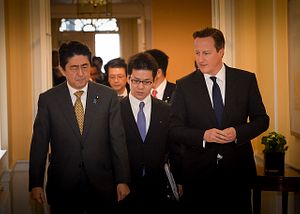Recent tensions in East Asia have led to debates across the region about strategic relationships with both China and Japan. There has been little similar debate in Europe, but some are calling for the U.K. to engage in greater security cooperation with Japan.
Given the U.K.’s reduced military capacity and its commitments elsewhere, an enhanced security relationship would have little material impact, but would be politically symbolic in the region. This is precisely why Britain should respond cautiously, in spite of the long-standing close ties between London and Tokyo.
Arguments for strengthening the U.K.-Japan relationship range from claims of shared political values, the potential for collaboration in military technology or the coordination of overseas development assistance, and the existence of shared security challenges. For some in Japan, the recent execution of Japanese hostages by the Islamic State has reinforced the case for a more assertive and outward-looking security policy. Others invoke memories of the 1902 Anglo-Japanese Alliance, and a sentimental affinity between these two island kingdoms.
Some also point to a limited window of opportunity for enhancing U.K.-Japan security cooperation, arguing that Japanese openness to this may not outlast the current government of Prime Minister Shinzo Abe.
In our view, however, the current state of Japanese politics dictates caution on Britain’s part. Tokyo’s main motivation for seeking U.K. cooperation is to secure an endorsement from a country still respected as an important global player, for a foreign and security policy that is controversial both at home and throughout the region. And notwithstanding references to a shared “Islamic State threat,” it is really uncertainty over how to deal with the rise of China which is driving Japanese security policy.
This cannot be divorced from a recent trend towards growing nationalism and historical revisionism with respect to Japan’s wartime past. Abe attempts to present a statesmanlike and moderate face to the West – as witnessed by his April address to the U.S. Congress. But his government’s education policies, its stance on the wartime exploitation of comfort women, more general official slipperiness over wartime atrocities, and manipulation of the domestic media have all contributed to aggravating tensions with China and Korea, and to marginalizing those within Japan who advocate a more robust and open reckoning with the legacy of war.
The invoking of historical analogies with the 1902 alliance is also problematic. That alliance was motivated by balance of power considerations at a time when Britain had substantial commercial, territorial, and military interests in the “Far East.” And it was ultimately ineffective in restraining Japanese regional ambitions.
Today, the U.S.-Japan alliance is similarly informed by “balance of power” calculations. This is understandable for a Japan nervous about China’s rise, but the U.K.’s interests today dictate wariness in contemplating closer security collaboration with either side in the Sino-Japanese relationship. While U.S. policy is driven by a desire to protect its considerable interests and influence, the U.K., with no meaningful strategic presence in East Asia, has nothing to gain from taking sides – and, potentially, much to lose.
In this context, any move by London to embrace a new security partnership with Japan risks being interpreted within East Asia as condoning the Abe regime’s policies in general, and its historical revisionism in particular. When it comes to relations with China, this represents an especially perilous course for Britain. In Chinese public consciousness, Britain occupies a prominent position alongside Japan in the gallery of the nation’s imperialist oppressors. A new U.K.-Japan security partnership would likely reinforce this image of the U.K. amongst Chinese, and have detrimental consequences for Sino-British relations.
This is not to argue that, in declining to endorse the Abe regime, Britain should position itself as unquestioningly “pro-China.” Far from it. Both Chinese and Japanese approaches to territorial disputes over the Diaoyu/Senkaku islands have adversely affected regional security, to the detriment of all countries with interests in a secure and prosperous East Asia. Indeed, were a similar offer of cozy bilateral security cooperation forthcoming from Beijing, London should reject this too.
The fundamental interest of the U.K. and Europe is in encouraging greater regional stability. This requires better relations between Japan and China. Rather than consider policies that could be construed as “containing” or “balancing” Chinese power, the U.K. should work (ideally with the rest of the EU) to encourage flexible adaptation to ongoing shifts in power distribution within the region, withholding its backing from those who hanker after a mythical “status quo.”
This means, amongst other things, encouraging Tokyo to deal more “diplomatically” – for want of a better word – with a rising China. It also means exhorting China to demonstrate to Japan and others that its strategic intentions are benign. And finally, it means using whatever influence Britain enjoys in Washington to discourage the U.S. from heightening tensions by adopting a strategy of “containment” vis-à-vis China, and pressing instead for more open and constructive relationships across the region. Given East Asia’s growing global importance, it is this approach that will best serve the U.K.’s long-term security and prosperity.
Dr. Edward Vickers is Associate Professor of Comparative Education at Kyushu University, Japan. Dr. Tim Summers is Adjunct Assistant Professor at The Chinese University of Hong Kong.

































